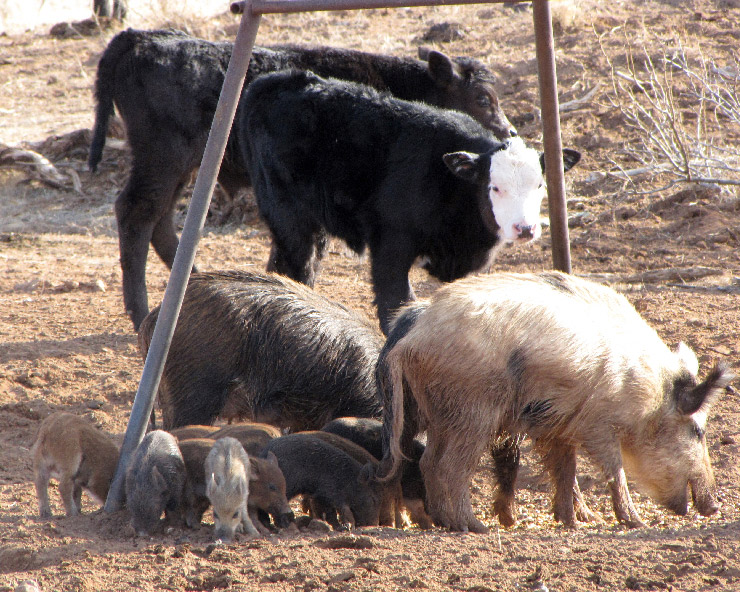As organic and alternative producers, we like to allow the animals we raise to exhibit their natural instincts, such as grazing, rooting, and frolicking in open spaces. Many of our animals spend their lives outside to allow this behavior. No matter where you’re located, some sort of wildlife inhabits the same land that you raise your animals on. Just as people visiting your farm can spread diseases, so can wildlife. These wild animals can also harm your fences and buildings and be an economic burden by eating the food intended for your livestock.
Exposure
Animals that can cause problems on your farm include rodents, deer, feral swine, foxes, coyotes, and birds. While it is impossible to completely eliminate your animals’ exposure to the surrounding wildlife, there are some steps you can take to decrease the risk of disease spread, predation, and property damage.
Your animals can come into contact with wildlife in a variety of ways. Occasionally, direct contact occurs in the case of nose-to-nose contact, bites, or predation. More commonly, problems occur when wildlife urinate and defecate in areas where your herd or flock eats, drinks, or sleeps. Wildlife can carry diseases such as leptospirosis, salmonellosis, or avian influenza. Viruses or bacteria shed in their feces or urine can be ingested and cause disease in your livestock.
Preventing problems
Maintaining your fences can keep your livestock contained while keeping larger wildlife out. If possible, don’t put animal paddocks in or close to heavily wooded areas where wildlife are more likely to inhabit. Buildings should be well sealed – a mouse can fit into any hole bigger than a quarter of an inch. Maintain the grounds surrounding each barn, mowing at least three feet around the perimeter to eliminate rodent breeding and feeding areas. All feed should be kept in rodent-proof metal bins, such as metal trash containers. Cleaning feed spills promptly can prevent rodents from being attracted to the area where you store feed.
Birds can be tricky to manage. It is vital to observe their habits – where do they perch, nest, and bathe? Once identified, you can take steps to try and prevent this behavior. Ideally, we would like to keep birds out of our barns. This can be done by shutting doors, closing up holes, or hanging plastic strips in doorways that cannot be closed. Installation of netting, screens, and bird spikes can prevent roosting and nesting in unwanted areas. Just as with rodents, it’s important not to attract them to your farm with spilled feed.
Getting rid of an ongoing problem
Observation is vital when it comes to identifying pest problems. Always be on the lookout for signs of urine, feces, or damage created by pests. After taking preventive steps, you may have to eliminate animals that have found their way into your buildings. Mechanical traps or rodent poisoning can be used to kill mice and rats. If you choose to use poison, it is best to invest in tamper-proof bait boxes that keep other animals and children out. Remember that rodents may take the bait out of the box and move it to different places on your farm, putting your animals at risk.
Don’t hesitate to reach out for help
Additional resources can be found at the bottom of this page. Local veterinarians or extension agents may have advice specific to your area. It is crucial to ensure that the type of animal you are trying to control is not endangered, threatened, or protected. If you have a pest problem you just can’t seem to get ahead of, it may be best to seek professional help. Having someone skilled in pest control and monitoring and removing rodents regularly takes a significant burden off your shoulders.
More Information:
Predator Control for Organic and Sustainable Livestock Production. ATTRA
Bird and Rodent Control Measures. Center for Food Security and Public Health
Controlling Rats and Mice around the Farm. University of Florida/Institute of Food and Agricultural Sciences (US/IFAS)
Wildlife and Feral animals. University of Vermont, healthy Farms Healthy Agriculture


Hey, would you mind if I share your blog with my twitter group?
There’s a lot of folks that I think would enjoy your content.
Please let me know. Thank you.
Absolutley! Feel free to share any of our posts!